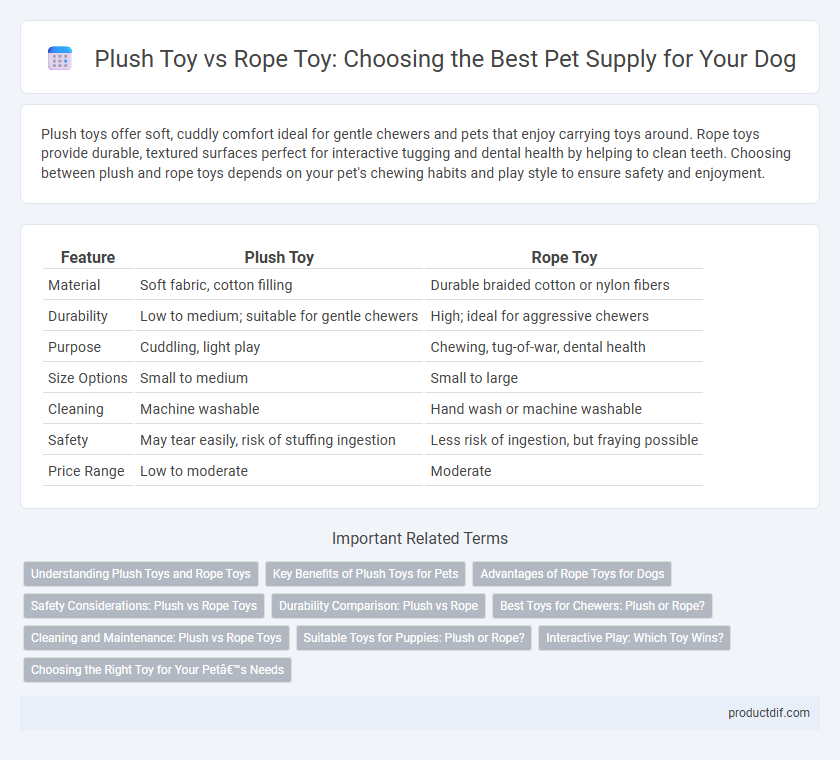Plush toys offer soft, cuddly comfort ideal for gentle chewers and pets that enjoy carrying toys around. Rope toys provide durable, textured surfaces perfect for interactive tugging and dental health by helping to clean teeth. Choosing between plush and rope toys depends on your pet's chewing habits and play style to ensure safety and enjoyment.
Table of Comparison
| Feature | Plush Toy | Rope Toy |
|---|---|---|
| Material | Soft fabric, cotton filling | Durable braided cotton or nylon fibers |
| Durability | Low to medium; suitable for gentle chewers | High; ideal for aggressive chewers |
| Purpose | Cuddling, light play | Chewing, tug-of-war, dental health |
| Size Options | Small to medium | Small to large |
| Cleaning | Machine washable | Hand wash or machine washable |
| Safety | May tear easily, risk of stuffing ingestion | Less risk of ingestion, but fraying possible |
| Price Range | Low to moderate | Moderate |
Understanding Plush Toys and Rope Toys
Plush toys offer soft, cuddly textures ideal for gentle chewing and comfort, making them perfect for small to medium-sized dogs. Rope toys feature durable fibers that help clean teeth and massage gums, promoting dental health during vigorous play. Choosing between plush and rope toys depends on your pet's chewing strength and play style to ensure safety and engagement.
Key Benefits of Plush Toys for Pets
Plush toys provide pets with comfort and companionship, often mimicking the warmth and softness of a littermate or parent, which can reduce anxiety and promote emotional well-being. Their lightweight and cuddly design is ideal for small to medium-sized pets that enjoy carrying and snuggling their toys during rest periods. Plush toys also encourage gentle play, helping to develop a pet's coordination and reducing the risk of dental wear compared to tougher rope toys.
Advantages of Rope Toys for Dogs
Rope toys for dogs offer superior dental benefits by naturally flossing teeth and massaging gums during play, reducing plaque and tartar buildup. Their durable, textured fibers withstand aggressive chewing, promoting longer-lasting entertainment compared to plush toys. Rope toys also encourage interactive play like tug-of-war, enhancing physical exercise and strengthening the bond between dog and owner.
Safety Considerations: Plush vs Rope Toys
Plush toys offer soft materials that reduce injury risk but may pose choking hazards if seams tear and stuffing is ingested, making supervision essential. Rope toys are durable and excellent for chewing, yet frayed fibers can cause intestinal blockages if swallowed, necessitating regular inspection and replacement. Choosing pet toys requires evaluating material safety and the pet's chewing behavior to minimize health risks.
Durability Comparison: Plush vs Rope
Plush toys often feature soft fabric exteriors that may wear down quickly with aggressive chewing, leading to tears and stuffing exposure. Rope toys are typically constructed from tightly woven cotton or synthetic fibers, providing enhanced durability and resistance to fraying, especially during robust play. For pets with strong chewing habits, rope toys generally offer longer-lasting performance compared to plush alternatives.
Best Toys for Chewers: Plush or Rope?
Rope toys offer superior durability and dental benefits for aggressive chewers compared to plush toys, which tend to tear easily and pose choking hazards. Plush toys provide comfort and entertainment for light chewers but are best suited for supervised play. Selecting rope toys made from natural fibers like cotton enhances safety and promotes healthy teeth cleaning in heavy chewers.
Cleaning and Maintenance: Plush vs Rope Toys
Plush toys require frequent surface cleaning to remove pet hair and debris, often needing gentle washing to maintain their softness and prevent fabric damage. Rope toys are more durable and can withstand rigorous washing, including machine washing, which helps eliminate bacteria and odors more effectively. Regular maintenance of rope toys reduces the risk of fraying and potential ingestion hazards, whereas plush toys may wear out faster with repeated washing, necessitating timely replacement.
Suitable Toys for Puppies: Plush or Rope?
Plush toys offer soft textures that soothe teething puppies and provide comfort, while rope toys promote dental health by helping to clean teeth and strengthen gums through chewing. Choosing between plush and rope toys depends on a puppy's chewing strength and play style, with plush toys suited for gentle chewers and rope toys better for aggressive chewers. Durable materials in rope toys withstand rough play, whereas plush toys often contain stuffing and squeakers that require supervision to prevent ingestion hazards.
Interactive Play: Which Toy Wins?
Interactive play with plush toys engages pets through soft textures and squeakers that stimulate gentle chewing and cuddling instincts, promoting comfort and bonding. Rope toys excel in tug-of-war games, promoting dental health by reducing plaque while encouraging vigorous physical activity and interactive bonding between pet and owner. For high-energy pets seeking active engagement, rope toys provide superior durability and stimulation, whereas plush toys suit pets favoring calm, affectionate play.
Choosing the Right Toy for Your Pet’s Needs
Plush toys offer softness and comfort, ideal for gentle chewers and pets seeking a cuddly companion, while rope toys provide durability and promote dental health by helping to clean teeth and massage gums during play. Selecting the right toy depends on your pet's chewing strength, play style, and safety considerations, with plush toys suited for less aggressive chewers and rope toys designed for pets requiring tough, interactive play. Understanding your pet's specific needs ensures you choose a toy that enhances enrichment and supports overall well-being.
Plush toy vs rope toy Infographic

 productdif.com
productdif.com